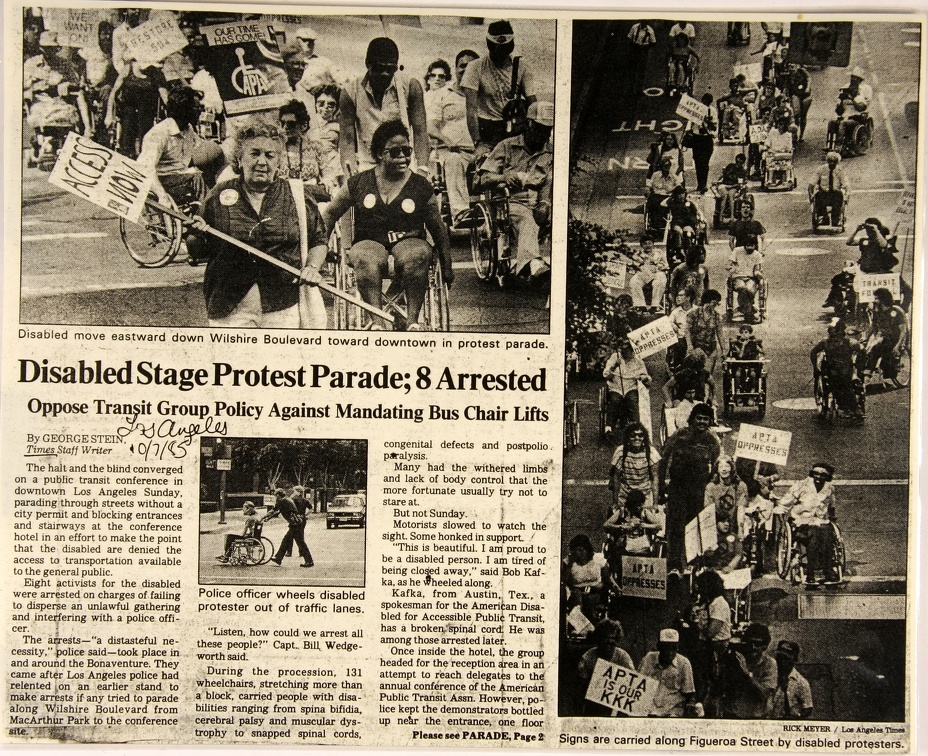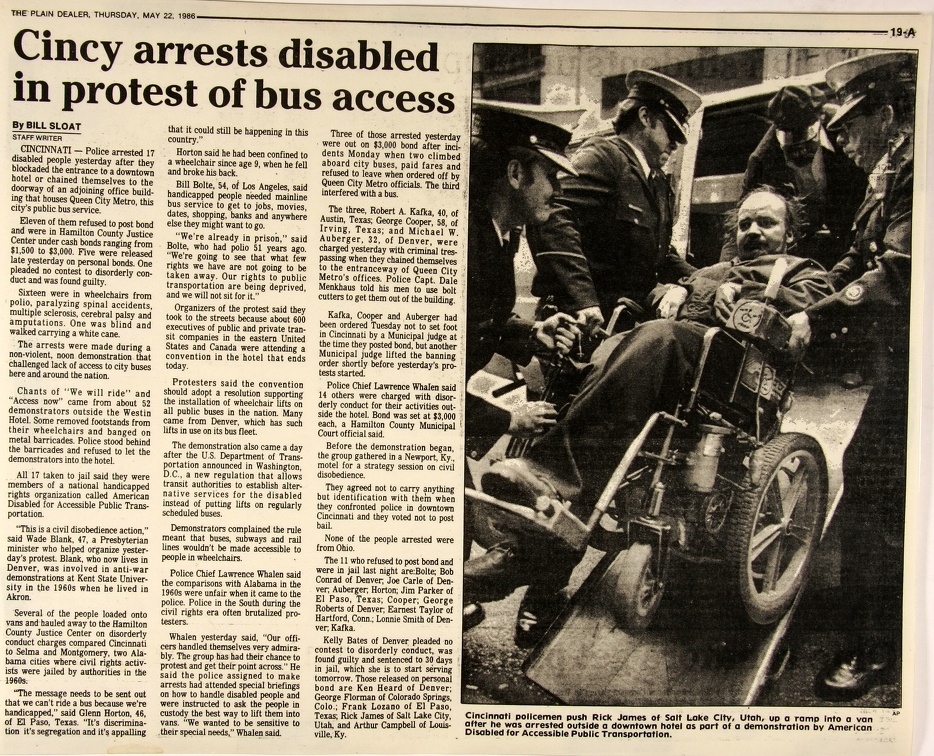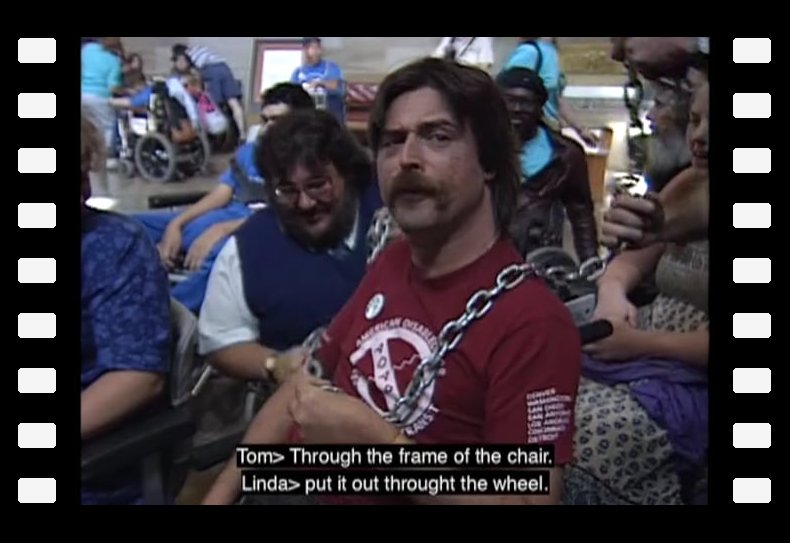- TungumálAfrikaans Argentina AzÉrbaycanca
á¥áá áá£áá Äesky Ãslenska
áá¶áá¶ááááá à¤à¥à¤à¤à¤£à¥ বাà¦à¦²à¦¾
தமிழ௠à²à²¨à³à²¨à²¡ ภาษาà¹à¸à¸¢
ä¸æ (ç¹é«) ä¸æ (é¦æ¸¯) Bahasa Indonesia
Brasil Brezhoneg CatalÃ
ç®ä½ä¸æ Dansk Deutsch
Dhivehi English English
English Español Esperanto
Estonian Finnish Français
Français Gaeilge Galego
Hrvatski Italiano Îλληνικά
íêµì´ LatvieÅ¡u Lëtzebuergesch
Lietuviu Magyar Malay
Nederlands Norwegian nynorsk Norwegian
Polski Português RomânÄ
Slovenšcina Slovensky Srpski
Svenska Türkçe Tiếng Viá»t
Ù¾Ø§Ø±Ø³Û æ¥æ¬èª ÐÑлгаÑÑки
ÐакедонÑки Ðонгол Ð ÑÑÑкий
СÑпÑки УкÑаÑнÑÑка ×¢×ר×ת
اÙعربÙØ© اÙعربÙØ©
Heim / Albúm / Merki Bob Kafka + George Florum
+ George Florum + Jim Parker
+ Jim Parker 3
3

 ADAPT (228)
ADAPT (228)
Los Angeles Times 10/7/85 [This article continues on ADAPT 227 but the entire text of the story is included here for easier reading,] 3 photos by Rick Meyer/Los Angles Times: photo 1 is of a section of the march with men and women of various ethnic backgrounds and disabilities walking, rolling and pushing others' chairs. There is a sense of energy in the group and many wear buttons and carry signs reading "Access Now", "Restore 504", and "Our Time has Come -- CAPH." Caption reads: Disabled move eastward down Wilshire Boulevard toward downtown in protest parade. Photo 2 is another picture of the march, taken from above. The crowd is loosely organized, many in the front are looking up and smiling. There are children with disabilities, people in neckties, people with headbands. In the crowd you can see Bill Bolte, Bob Kafka, Gil Casarez among many others. Some carry signs on sticks reading "APTA oppresses", as well as "Transit for All" and one about ADAPT. Caption reads: Signs are carried along Figueroa Street by disabled protesters. Photo 3 (much smaller) is of a police officer pushing a man in a manual wheelchair (Jim Parker) to the side of the street while another officer seems to be stopping a car. Caption reads: Police officer wheels disabled protester out of traffic lanes. [Headline] Disabled Stage Protest Parade; 8 Arrested Oppose Transit Group Policy Against Mandating Bus Chair Lifts By GEORGE STEIN Times Staff Writer The halt and the blind converged on a public transit conference in downtown Los Angeles Sunday, parading through streets without a city permit and blocking entrances and stairways at the conference hotel in an effort to make the point that the disabled are denied the access to transportation available to the general public. Eight activists for the disabled were arrested on charges of failing to disperse an unlawful gathering and intefering with a police officer. The arrests —“a distasteful necessity," police said -- took place in and around the Bonaventure. They came after Los Angeles police had relented to an earlier stand to make arrests if any tried to parade along Wilshire Boulevard from MacArthur Park to the conference. “Listen, how could we arrest all these people?" Capt. Bill Wedgeworth said. During the procession, 131 wheelchairs, stretching more than a block, carried people with disabilities ranging from spina bifidia, cerebral palsy and muscular dystrophy to snapped spinal cords, congenital defects and postpolio paralysis. Many had the withered limbs and lack of body control that the more fortunate usually try not to stare at. But not Sunday. Motorists slowed to watch the sight. Some honked in support. “This is beautiful. I am proud to be a disabled person. I am tired of being closed away," said Bob Kafka, as he wheeled along. Kafka, from Austin, Tex., a spokesman for the American Disabled for Accessible Public Transit, has a broken spinal cord. He was among those arrested later. Once inside the hotel, the group headed for the reception area in an attempt to reach delegates to the annual conference of the American Public Transit Assn. However, police kept the demonstrators bottled up near the entrance, one floor above the main reception area. "Access now! Access now!" the demonstrators shouted. The crowd, which came from a spectrum of disabled activist groups in and out of California, targeted the transit convention because the organization opposes a national policy mandating wheelchair lifts on buses. The American Public Transit Assn.'s position is to let each transit agency deal with access for the disabled as a local decision. In Los Angeles, the Southern California Rapid Transit District, with 2,445 buses, has wheelchair lifts on 1,691 and is retrofitting another 200. The RTD hopes to have lifts on all buses in five years, which, according to a spokesman, would probably make it the first major urban bus system to be so equipped. After the demonstrators blocked hotel escalator wells for almost an hour, Wedgeworth told them their gathering was illegal. The actual arrests were an odd orchestration of defiance and cooperation. Escalator Well George Florom, a member of the disabled group from Colorado Springs, Colo., began thrashing as police tried to remove him from an escalator well. It took three officers to subdue him. “He began kicking and trying to bite me, so he had to go," Lt Ken Colby explained. One of the demonstrators grabbed an officer's gun, police said. Florom, lay quietly once handcuffed, and police gently placed him in his wheelchair and wheeled him to a lift-equipped van that had been arranged for the occasion. Trained medical personnel also were on hand. Edith Harris of Hartford, Conn., had earlier failed in an attempt to get arrested, tearing up American Disabled for Accessible Public Transit literature and throwing it on Figueroa Street. "Arrest me,“ she screamed to ‘no avail from her motorized wheelchair. The police only moved her to the sidewalk, and an officer went back to [unreadable] trash. Her wish was granted later, after she tried to herself down one of the blocked escalators. Then she calmed down, gratefully accepting a drink of water from a police officer, while waiting for a stretcher to arrive. Unhandcuffed, sitting upright, she was placed in the van. Her wheelchair was carefully handed in after her. Taken to Station The arrestees were taken to the Central Division station for processing. The seven men were later booked at County Jail, where bail was set at $500. Harris was booked at Sybil Brand Institute. Some police worried that the department's image would suffer from Sunday's action. “We look bad, no matter what we do," Sgt. Bill Tiffany said. After the arrests, a spokesman said, “It must be stressed that the Los Angeles Police Department has repeatedly tried to meet with demonstration leaders in the attempt to provide legal alternatives to accomplish their objectives and avoid the distasteful necessity of arresting handicapped citizens.” The police were not alone in their concern. Five months before the convention, according to Mark Johnson, 34, of Westminster, Colo., an organizer for the disabled group, RTD board member Jack Day flew to Denver to try to talk the organization out of civil disobedience. Negotiations foundered on an demand by the disabled group that the RTD introduce and support a proposal that the American Public Transit Assn. reverse its stand and back mandatory wheelchair lifts on buses, Johnson said. He said the disabled activists will be in town through Wednesday. The American Public Transit Assn. is a lobbying and policy organization. The five-day convention began Sunday. ADAPT (267)
ADAPT (267)
THE PLAIN DEALER, THURSDAY, MAY 22; 1986 page 19-A PHOTO by AP: Four policemen in their fancy police hats are "rolling" a man (Rick James) up a 150 degree (ie. almost vertical) "ramp" into a van. Rick is sitting with his hands up by his chest. His hat is missing and his hair is flying out in all directions. His expression is a mix of amazement, disgust and resignation. Caption reads: Cincinnati policemen push Rick James of Salt Lake City, Utah, up a ramp into a van after he was arrested outside a downtown hotel as part of a demonstration by American Disabled for Accessible Public Transportation. Title: Cincy arrests disabled in protest of bus access By BILL SLOAT STAFF writer CINCINNATI — Police arrested l7 disabled people yesterday after they blockaded the entrance to a downtown hotel or chained themselves to the doorway of an adjoining office building that houses Queen City Metro, this city’s public bus service. Eleven of them refused to post bond and were in Hamilton County Justice Center under cash bonds ranging from $1,500 to $3,000. Five were released late yesterday on personal bonds. One pleaded no contest to disorderly conduct and was found guilty. Sixteen were in wheelchairs from polio, paralyzing spinal accidents, multiple sclerosis, cerebral palsy and amputations. One was blind and walked carrying a white cane. The arrests were made during a non-violent, noon demonstration that challenged lack of access to city buses here and around the nation. Chants of “We will ride" and “Access now” came from about 52 demonstrators outside the Westin Hotel. Some removed footstands from their wheelchairs and banged on metal barricades. Police stood behind the barricades and refused to let the demonstrators into the hotel. All 17 taken to jail said they were members of a national handicapped rights organization called American Disabled for Accessible Public Transportation. “This is a civil disobedience action," said Wade Blank, 47, a Presbyterian minister who helped organize yesterday's protest. Blank, who now lives in Denver, was involved in anti-war demonstrations at Kent State University in the 1960s when he lived in Akron. Several of the people loaded onto vans and hauled away to the Hamilton County Justice Center on disorderly conduct charges compared Cincinnati to Selma and Montgomery, two Alabama cities where civil rights activists were jailed by authorities in the 1960s. “The message needs to be sent out that we can’t ride a bus because we're handicapped,” said Glenn Horton, 46, of El Paso, Texas. "It's discrimination it’s segregation and it’s appalling that it could still be happening in this country." Horton said he had been confined to a wheelchair since age 9, when he fell and broke his back. Bill Bolte, 54, of Los Angeles, said handicapped people needed mainline bus service to get to jobs, movies, dates, shopping, banks and anywhere else they might want to go. “We're already in prison," said Bolte, who had polio 51 years ago. “We're going to see that what few rights we have are not going to be taken away. Our rights to public transportation are being deprived, and we will not sit for it." Organizers of the protest said they took to the streets because about 600 executives of public and private transit companies in the eastern United States and Canada were attending a convention in the hotel that ends today. Protesters said the convention should adopt a resolution supporting the installation of wheelchair lifts on all public buses in the nation. Many came from Denver, which has such lifts in use on its bus fleet. The demonstration also came a day after the U.S. Department of Transportation announced in Washington, D.C., a new regulation that allows transit authorities to establish alternative services for the disabled instead of putting lifts on regularly scheduled buses. Demonstrators complained the rule meant that buses, subways and rail lines wouldn't be made accessible to people in wheelchairs. Police Chief Lawrence Whalen said the comparisons with Alabama in the 1960s were unfair when it came to the police. Police in the South during the civil rights era often brutalized protesters. Whalen yesterday said, “Our officers handled themselves very admirably. The group has had their chance to protest and get their point across." He said the police assigned to make arrests had attended special briefings on how to handle disabled people and were instructed to ask the people in custody the best way to lift them into vans. “We wanted to be sensitive to their special needs." Whalen said. Three of those arrested yesterday were out on $3,000 bond after incidents Monday when two climbed aboard city buses, paid fares and refused to leave when ordered off by Queen City Metro officials. The third interfered with a bus. The three, Robert A. Kafka, 40, of Austin, Texas; George Cooper, 58, of Irving, Texas; and Michael W. Auberger, 32, of Denver, were charged yesterday with Criminal trespassing when they chained themselves to the entranceway of Queen City Metro's offices. Police Capt. Dale Menkhaus told his men to use bolt cutters to get them out of the building. Kafka, Cooper and Auberger had been ordered Tuesday not to set foot in Cincinnati by a Municipal judge at the time they posted bond, but another Municipal judge lifted the banning order shortly before yesterday's protests started. Police Chief Lawrence Whalen said 14 others were charged with disorderly conduct for their activities outside the hotel. Bond was set at $3,000 each, a Hamilton County Municipal Court official said. Before the demonstration began, the group gathered in a Newport, Ky., motel for a strategy session on civil disobedience. They agreed not to carry anything but identification with them when they confronted police in downtown Cincinnati and they voted not to post bail. None of the people arrested were from Ohio. The 11 who refused to post bond and were in jail last night are: Bolte; Bob Conrad of Denver; Joe Carle of Denver; Auberger; Horton; Jim Parker of El Paso, Texas; Cooper; George Roberts of Denver; Earnest Taylor of Hartford, Conn.; Lonnie Smith of Denver; Kafka. Kelly Bates of Denver pleaded no contest to disorderly conduct, was found guilty and sentenced to 30 days in jail, which she is to start serving tomorrow. Those released on personal bond are Ken Heard of Denver; George Florman of Colorado Springs, Colo.; Frank Lozano of El Paso, Texas; Rick James of Salt Lake City, Utah; and Arthur Campbell of Louisville, Ky. US_Capitol_Rotunda_part_2_cap
US_Capitol_Rotunda_part_2_cap
This is part 2 of the ADAPT Capitol Rotunda protest in support of the Americans with Disabilities Act, ADA. This shows the group preparing for civil disobedience to pressure swift passage of the bill. Over 100 people were arrested at this protest, which gets less attention than the Crawl but was equally intense. The film is open captioned (as are all videos on this museum site).